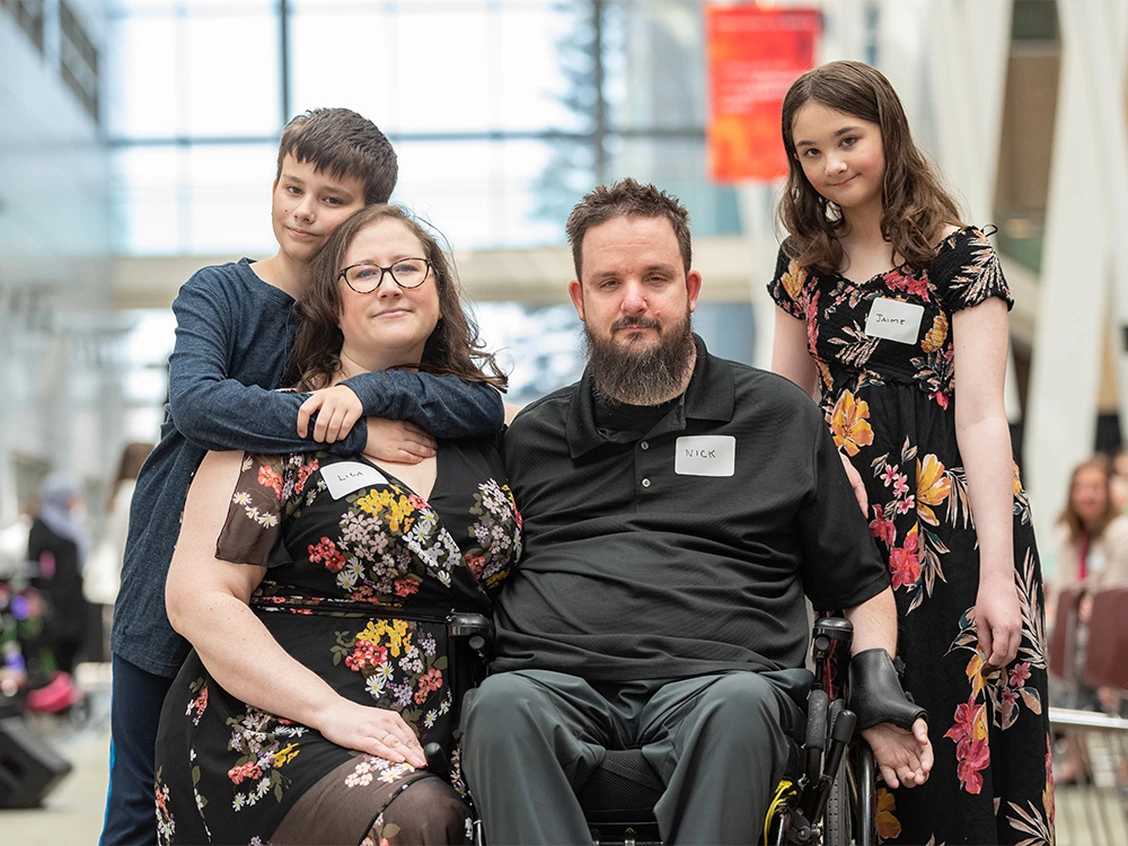Calgary researchers building one of ‘key centres in the world’ for neurological disorder therapies
A new network of health researchers and providers is working to introduce innovative therapies, clinical trials and technology for people with spinal cord injury, stroke and movement impairments.

Dr. Elizabeth Condliffe, specialist in physical medicine and rehabilitation and clinical associate professor at the University of Calgary, left, and Alex Mertens, who was born with cerebral palsy, use Trexo Robotics assistive tech to take a walk during an event hosted by RESTORE (REsearching STrategies fOr Rehabilitation) Network, which is combining research and technology to improve the lives of people with spinal cord injury, stroke and movement impairments, on Tuesday, May 2, 2023. Mertens uses her Trexo to walk around 2,000 steps a day in her neighbourhood and walk her dog sometimes. Photo by Azin Ghaffari/Postmedia
Stephanie Babych, Calgary Herald May 02, 2023
The RESTORE (Researching Strategies for Rehabilitation) Network is combining resources from the University of Calgary Cumming School of Medicine and Alberta Health Services to research new ways to improve the quality of life for those with neurological disorders.
“We are truly becoming one of the key centres in the world for the development of new technology for rehabilitation,” said Dr. Aaron Phillips, director of the RESTORE Network.
“Over the next five years, our vision is to develop a fully operational engineering space for next-generation technology to be ideated, fabricated, validated and finally disseminated, so that our clinical community can benefit from our new discoveries.”

Aaron Phillips and Nick Wiltshire discuss the stimulation device will be implanted in Wiltshire’s spine. Riley Brandt, University of Calgary
| Calgarian participating in study implanting stimulators in people’s spines |
The highly specialized group of academic and clinical experts come from the Hotchkiss Brain Institute, Libin Cardiovascular Institute, McCaig Institute for Bone and Joint Health, and the Alberta Children’s Hospital Research Institute within the Cumming School of Medicine.
“This is a powerful example of how collaboration between health-care providers, researchers and the community translates to real-world treatment that can dramatically improve the lives of many patients with neurological conditions,” said Dr. Mark Anselmo, medical director of the AHS Calgary Zone.
Nick Wiltshire, a study participant, said it’s incredible to have such technology and innovation in Calgary.
Wiltshire was left tetraplegic following a vehicle collision in 2001. He’s participating in the first Canadian study that’s implanting stimulators in people’s spines to improve blood pressure control.
“A lot of people don’t realize all of the complications with spinal cord injury that severely impact daily life,” said Wiltshire. “My blood pressure drops several times a day very suddenly, which makes me light-headed, at risk of fainting and greatly affects my daily function.”

Nick Wiltshire, who was left tetraplegic after a motor vehicle accident in 2001, is pictured with his family at an event hosted by RESTORE (REsearching STrategies fOr Rehabilitation) Network, which is combining research and technology to improve the lives of people with spinal cord injury, stroke and movement impairments, on Tuesday, May 2, 2023. Wiltshire is a participant in the first study in Canada that improves blood pressure control by implanting stimulators in the spine. Photo by Azin Ghaffari/Postmedia
| Network was established with generous bequest from estate of Edith Rodie |
Also among RESTORE Network-funded initiatives is Foothills Medical Centre’s virtual reality treadmill, which is meant to assist in stroke recovery, and a robotic-assisted walking device for children with mobility challenges at the Alberta Children’s Hospital.

Dr. Sean Dukelow, left, looks on as Judy Kirton, centre, walks on a treadmill with the help of physiotherapist Tanya Chopra in Calgary on April 28, 2023. Researchers at the University of Calgary are working to develop new technologies for people living with neurological disorders. Jeff McIntosh, The Canadian Press. CBC
Dr. Todd Anderson, the dean of the Cumming School of Medicine, said the network is an example of what’s possible through collaboration “to drive change and improve lives by translating research to care.”
Murray Sigler, president and CEO of the Calgary Health Foundation, said the network was established with a generous bequest from the estate of Edith Rodie to the University of Calgary and Calgary Health Foundation.
“Edith Rodie’s gift is a catalyst for breakthroughs in care for those living with neurological disorders and creates a clear understanding of how community members drive medicine forward, both in life and in legacy,” said Sigler.
Rodie suffered a spinal cord injury after becoming a successful equestrian show jumper, trainer and coach.
“The ability for Calgary Health Foundation and the University of Calgary to jointly support the vision of the RESTORE Network through this gift has created a foundation for new and emerging opportunities that will forever transform people’s lives,” said Sigler.
![]() Source Calgary Herald
Source Calgary Herald
Also see
RESTORE Network combines research with innovative technologies for people with neurological disorders University of Calgary
The formidable woman who inspired RESTORE Network’s neurorehabilitation research University of Calgary
Combining research with innovative technologies for people with neurological disorders University of Calgary
New network launches in Calgary to study, improve neurological rehabilitation CBC News
